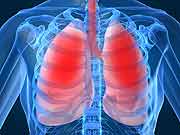
WEDNESDAY, April 29, 2015 (HealthDay News) — Chronic obstructive pulmonary disease (COPD) is already the third leading cause of death in the world, and a new European study finds the respiratory illness might also raise a person’s odds for sudden cardiac death.
COPD is a progressive and incurable illness that involves a combination of emphysema and bronchitis, and is often tied to smoking. The researchers said that the disease has already been associated with an increased risk of heart disease and sudden cardiac death in certain high-risk patient populations.
Now, the new study “shows that COPD is a risk indicator for sudden cardiac death in the general population, and that the risk increases with COPD severity,” wrote a team led by Dr. Lies Lahousse, a postdoctoral researcher at Ghent University Hospital in Belgium.
One expert in the United States said that even though the study can’t prove that COPD helps trigger sudden cardiac death, the European findings aren’t surprising.
“Many patients who have COPD are or were smokers, and smoking is the number one cause of heart disease,” said Dr. Len Horovitz, a pulmonary specialist at Lenox Hill Hospital in New York City.
“COPD is also associated with cardiac arrhythmia, such as atrial fibrillation,” he added. Atrial fibrillation is an irregular heartbeat. “These events can lead to sudden cardiac death.”
The new study involved more than 13,000 people aged 45 and older, more than 1,600 of whom were diagnosed with COPD.
Over the course of the study, 39 percent of the participants died. Of those deaths, 551 were related to sudden cardiac death. Breaking it down even further, the researchers found that 15 percent of those who died of sudden cardiac death had COPD.
Overall, a diagnosis of COPD increased the risk for sudden cardiac death by 34 percent, the team concluded.
Five years after being diagnosed with the lung condition, however, that risk nearly doubles, according to the study published online April 29 in the European Heart Journal.
After five years of living with COPD, the risk for sudden cardiac death becomes more than threefold higher for people who suffer frequent COPD symptom flare-ups, such as shortness of breath and coughing, the findings showed.
The study participants with COPD who experienced sudden cardiac death were more likely to die during the night, the researchers said.
That last finding suggests that cardiac arrhythmias may play a role, according to Dr. Girish Nair, director of the Interstitial Lung Disease Program and Pulmonary Rehabilitation at Winthrop-University Hospital in Mineola, N.Y.
He also wondered about the role of COPD medications.
“Presuming that patients with more frequent [COPD] exacerbations are using inhalers more often, future studies should look into possible interactions between various medications and other mechanisms related with sudden cardiac death in this particular subset of patients,” Nair said.
There are ways to lessen heart risks for COPD patients, the researchers stressed. Some preventative treatments include beta-blocker medications, implanted defibrillators to regulate heartbeat, or avoiding certain drugs that affect the heart’s electrical cycle, such as adrenaline, certain cold remedies, some antibiotics and antidepressants.
Avoiding cigarettes and other tobacco products is also essential, the study authors added.
“The most important way to prevent COPD and sudden cardiac death is not to smoke and to have a healthy lifestyle,” study co-author Dr. Marieke Niemeijer of Erasmus Medical Centre in Rotterdam, the Netherlands, said in a journal news release. “If a person does develop COPD, then this is even more important, as smoking, an unhealthy and a sedentary lifestyle have been proven to increase the risk of sudden cardiac death.”
According to background information in the study, sudden cardiac death is responsible for about 50 percent of all heart disease deaths worldwide. There are several causes of sudden cardiac death, which makes diagnosis and treatment of the condition more difficult.
More information
The U.S. National Heart, Lung, and Blood Institute has more about COPD.
Copyright © 2026 HealthDay. All rights reserved.

